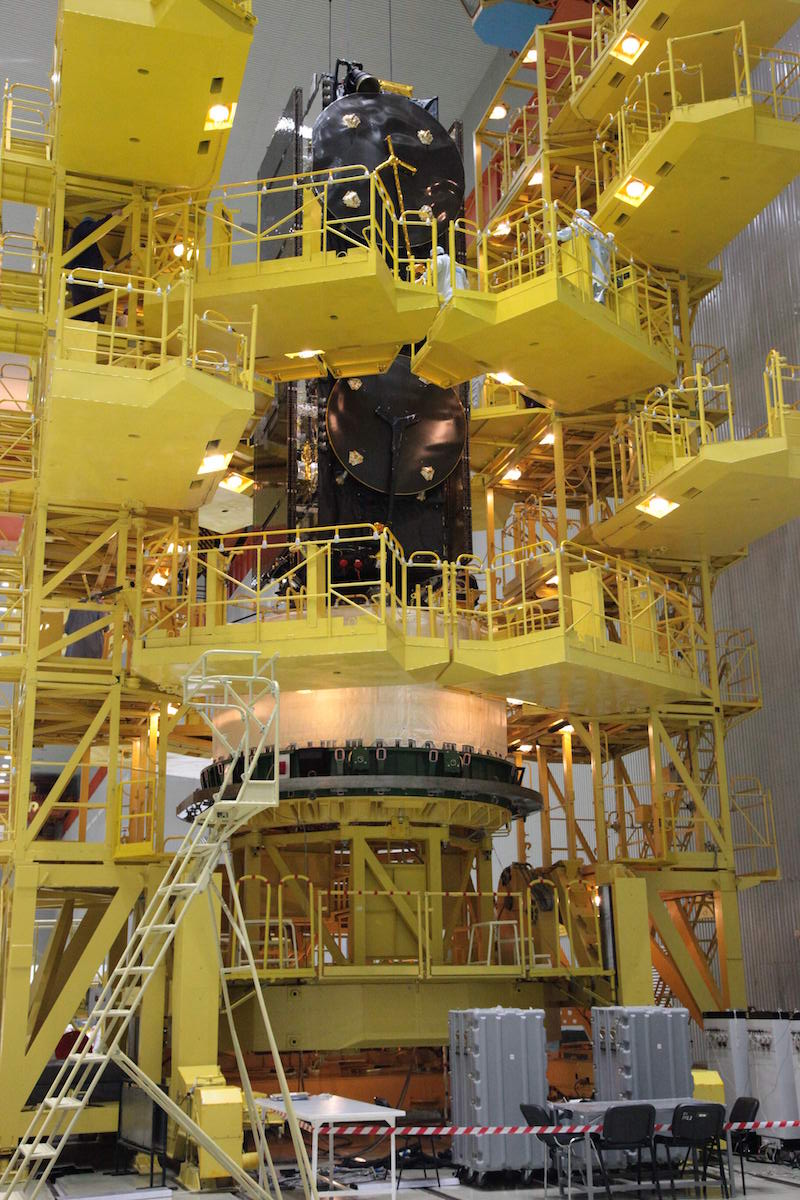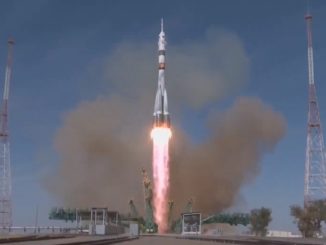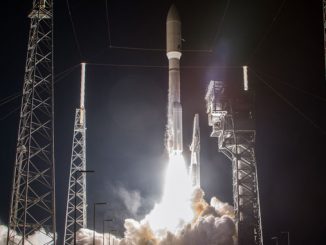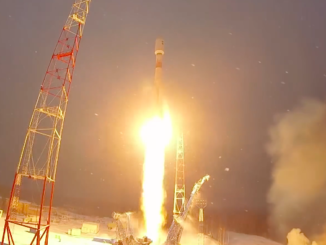EDITOR’S NOTE: Updated July 31 after deployment of the Express 80 and Express 103 satellites.
Flying for the first time this year, a Proton rocket streaked into space Thursday from the Baikonur Cosmodrome in Kazakhstan with two Russian Express communications satellites that will beam television, radio and broadband signals across the country.
The 191-foot-tall (58.2-meter) Proton rocket fired away from its launch pad at Baikonur at 5:25:19 p.m. EDT (2125:19 GMT) Thursday, or at 2:25 a.m. Friday in Baikonur.
A live Russian webcast of the launch showed the rocket igniting its six RD-276 main engines and climbing away from the Site 200 launch complex at Baikonur. The six engines, each burning toxic hydrazine and nitrogen tetroxide propellants, combined to produce 2.5 million pounds of thrust in the first two minutes of the flight.
Liftoff of a Proton rocket from the Baikonur Cosmodrome, carrying two Russian Express communications satellites on an 18-hour ride toward their final positions in geostationary orbit. WATCH LIVE: https://t.co/51KhCVxAJ0 pic.twitter.com/CahXRzA7ro
— Spaceflight Now (@SpaceflightNow) July 30, 2020
The Proton rocket disappeared into clouds over Baikonur less than a minute into the mission. Updates on the Russian launch webcast indicated the three-stage Proton booster performed as designed before releasing a Breeze M upper stage less than 10 minutes after liftoff.
Five burns by the Breeze M’s main engine were planned to maneuver the Russian Express 80 and Express 103 communications satellites into a high-altitude orbit ranging in altitude between 10,300 miles (16,600 kilometers) and 34,100 miles (54,900 kilometers).
The first Breeze M burn was programmed to place the Express 80 and Express 103 spacecraft into a preliminary low-altitude parking orbit. The additional maneuvers over the 18-hour launch sequence were expected raise the orbit higher and nudge the satellites closer to their final operating positions over the equator.
According to Roscosmos, Russia’s space agency, the Breeze M upper stage release the Express 80 spacecraft — riding in the upper position in the dual-satellite stack — at 11:24 a.m. EDT (1524 GMT) Friday. The deployment of Express 103 followed 17 minutes later at 11:41 a.m. EDT (1541 GMT), officials said.
Express 80 and Express 103, which weigh a combined 9,680 pounds (4,391 kilograms), were stacked one on top of the other for launch.
Roscosmos declared the launch a success, and said ground teams were in control of both satellites following their separation from the Proton’s Breeze M upper stage. The Express satellites will use electric thrusters to reach their final positions in circular geostationary orbits at an altitude of more than 22,000 miles (nearly 36,000 kilometers).
Express 80 is heading to a slot along the equator 80 degrees east longitude, while Express 103 will enter service at 96.5 degrees east. Both satellites were built by ISS Reshetnev, a Russian spacecraft manufacturer, and are designed for 15-year missions.

The satellites each have 18 C-band transponders, 20 Ku-band transponders, and an L-band payload, according to Thales Alenia Space of Italy, which supplied the satellites’ communications payloads.
The new spacecraft will provide fixed and mobile communications, digital TV and radio broadcasting services, high-speed Internet connectivity, and other data transmission services, Roscosmos said.
The Express satellites are owned by the Russian Satellite Communications Company, or RSCC, a state-owned operator of Russian telecom satellites. The national operator provides civilian satellite communications services across Russia and neighboring countries.
Like other satellites in RSCC’s Express fleet, Express 80 and Express 103 will also relay communications for the Russian president and other senior government officials, according to ISS Reshetnev.
The launch of the two new Express satellites marked the first flight of a Proton rocket since December. The Proton is Russia’s most powerful operational rocket, but it’s due to eventually be replaced by Russia’s new Angara rocket.
The mission with Express 80 and Express 103 was delayed from earlier this year to address a problem with defective bolts on the launch vehicle. Russian officials delayed the launch one more day — from Wednesday — to perform additional checks on the rocket.
Email the author.
Follow Stephen Clark on Twitter: @StephenClark1.



